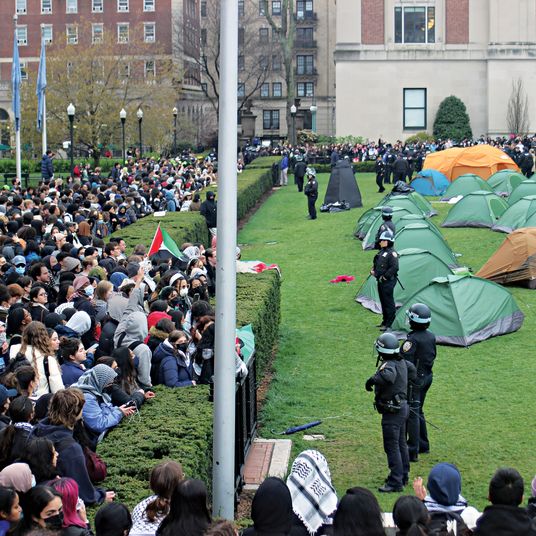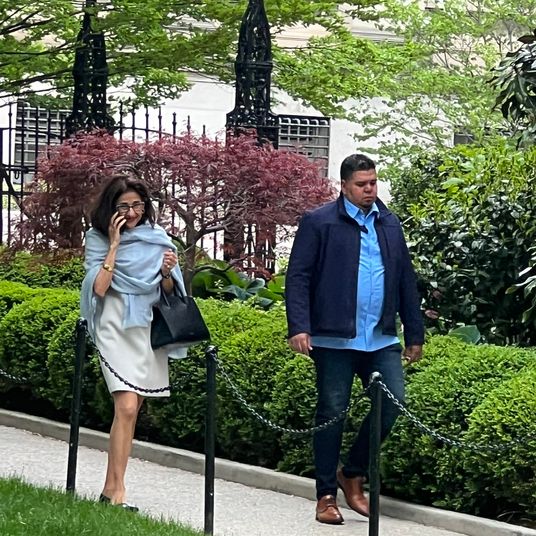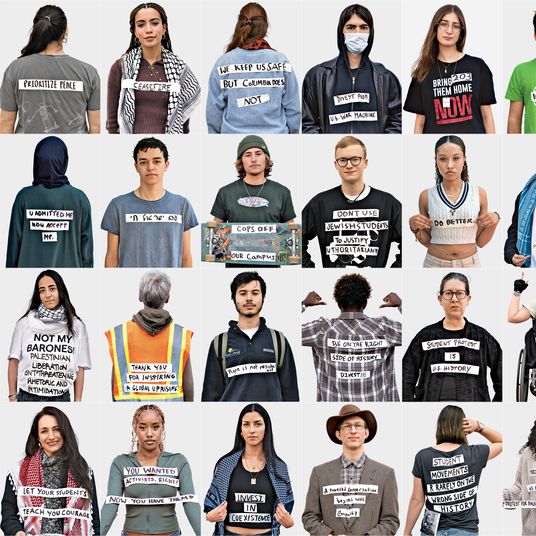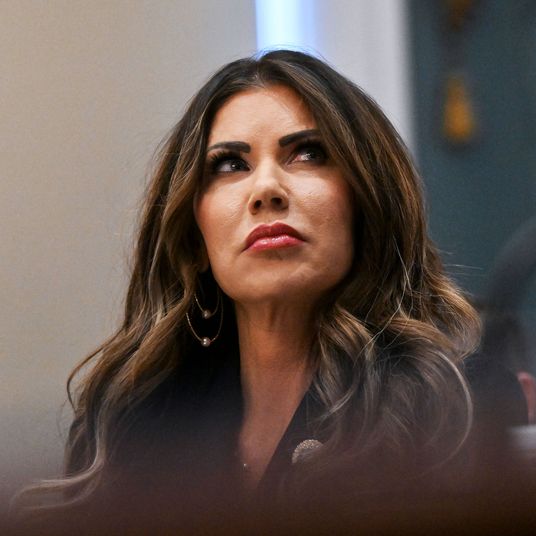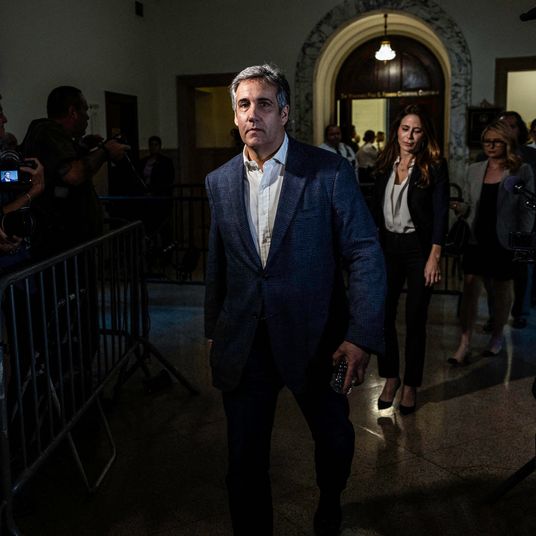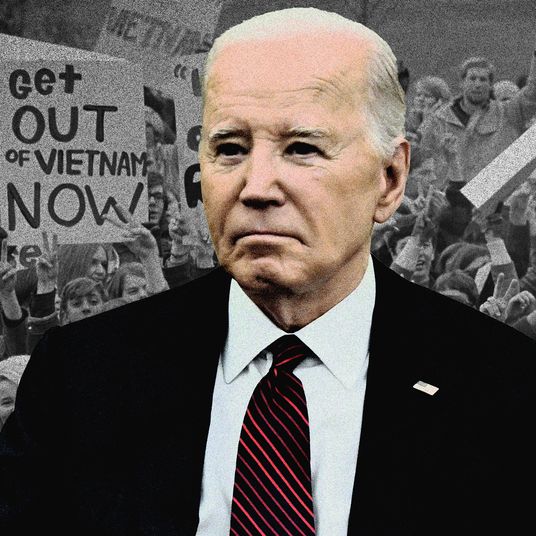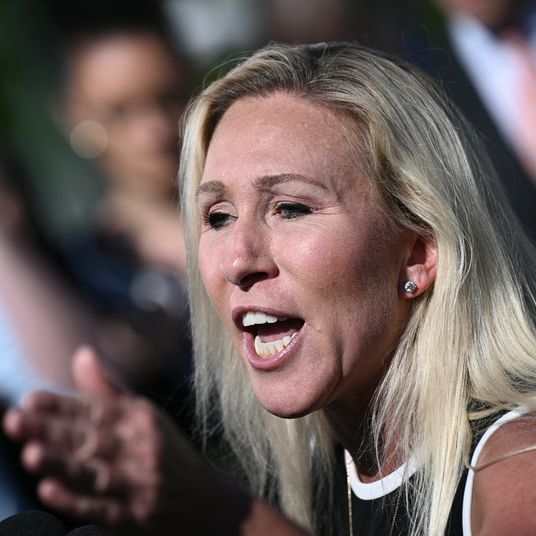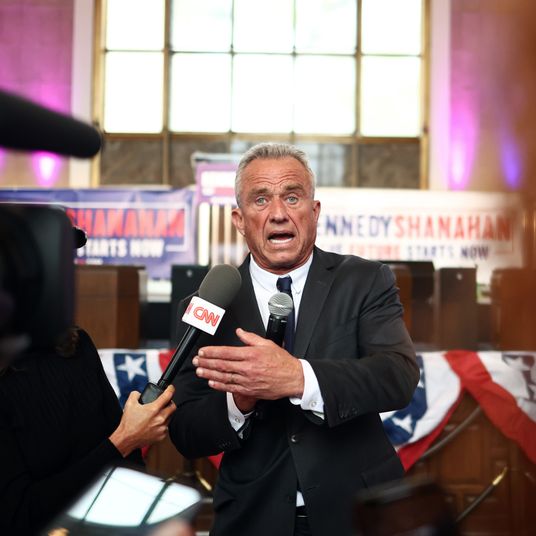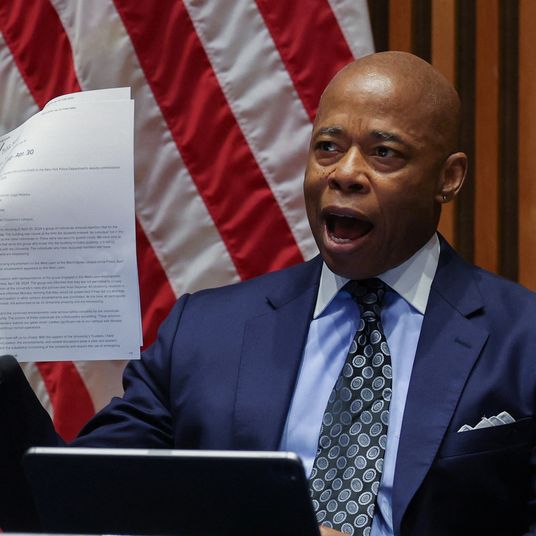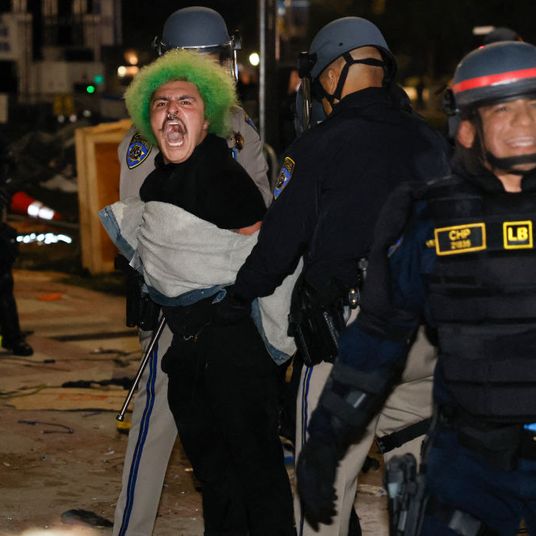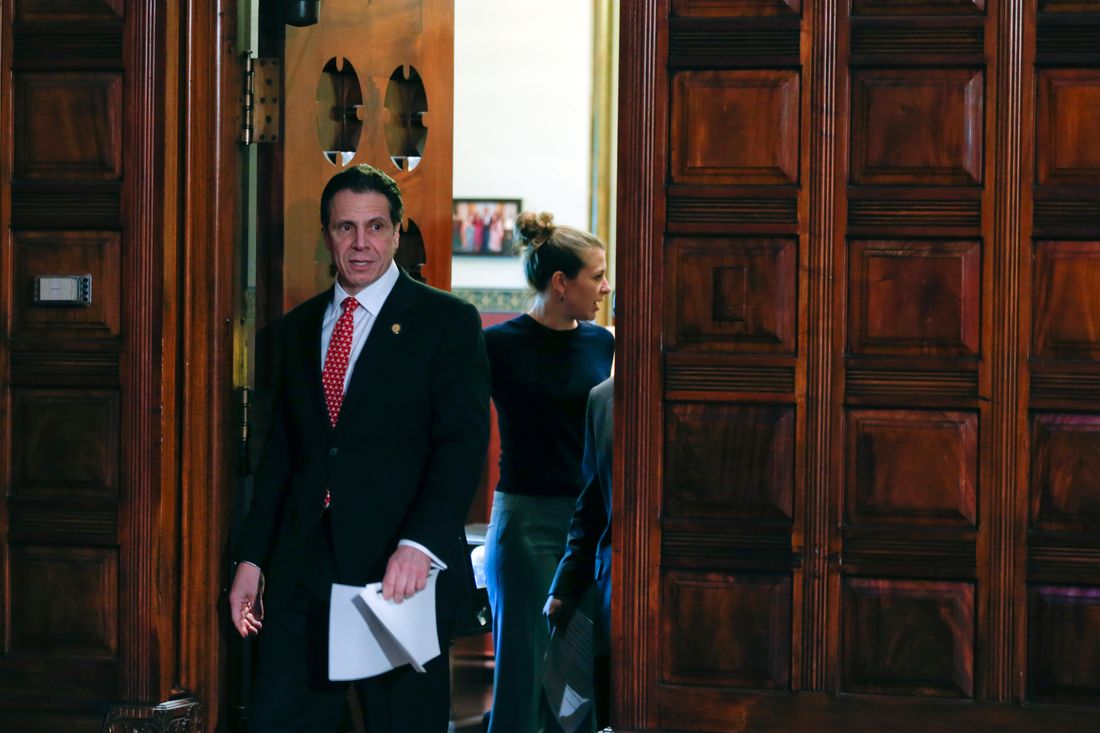
Three central questions about power are how to get it, how to wield it, and what to do when you lose it.
The story of Melissa DeRosa, chief lieutenant to former New York governor Andrew Cuomo, traces all these stages and is particularly revealing about that third act, which she is currently performing. Her new memoir, What’s Left Unsaid: My Life at the Center of Power, Politics & Crisis, is billed as her chance to tell her version of the downfall of her old boss, who resigned in 2021 after the Office of the New York State Attorney General found he had sexually harassed 11 women, nine of them his employees. It is a rare document: While we are used to former officials writing about their time in government, these are not typically officials whose bosses have stepped down in disgrace.
For those not steeped in Cuomo lore, DeRosa may seem like a mere bureaucrat. But for those who reported on or crossed the administration and experienced her wrath firsthand, she is an infamous figure, not the power behind the throne but power’s steely right hand. Cuomo ruled Albany through intimidation and fear, and DeRosa rose so high in the governor’s orbit in part because of her facility for his baleful style of communication. As many have described over the years, when DeRosa spoke — often in haranguing tones — it was as if she were channeling him.
Cover Story
In fact, how you feel about DeRosa’s book will depend on how you feel about Cuomo. “People use the word Machiavellian to describe Cuomo,” DeRosa writes, “but what they really mean is effective.” This is one of the first hints that DeRosa is writing not a tell-all about her former boss but rather a full-throated defense of him and his record, which was tarred in its final days not only by the accusations of sexual harassment but also by his oversight of one of the highest COVID casualty counts in the country and the cover-up of deaths of elderly pandemic victims in New York nursing homes. But it was precisely DeRosa’s complete loyalty, we learn, that made her invaluable. “At age 38,” she writes, she was the most senior member of his regime, appearing at his daily COVID briefings, “leading the nation through a once-in-a-century pandemic, making life-or-death decisions, projecting our administration’s competence to an admiring world.”
His resignation, and the bad press that precipitated it, upended her world. “I had been transformed into a caricature I didn’t recognize — a person I never was and didn’t want to be,” she writes. “It had all unfolded too quickly to slow or stop, like falling onto the tracks of an oncoming train. The words What just happened? wouldn’t stop reverberating through my entire body.”
DeRosa’s exploration of this question never reaches the level of meaningful self-reflection. Actually, to note that this memoir lacks self-reflection is like observing that Moby-Dick lacks zebras. It is ostensibly an attempt to set the record straight, but it is really an exercise in rehabilitating her image as a glass-ceiling breaker while painting Cuomo in a heroic light. As a document, its relationship to truth is casual, and it’s filled with reconstructed dialogue that reads like a cut-rate version of her favorite show, The West Wing. (“‘Steph, are we ready?’ ‘Yes, Governor. PowerPoint is loaded.’ ‘Okay, guys. Let’s go.’ Rob and I locked eyes as we turned to walk into the Red Room.”)
DeRosa’s book tour — replete with an interview in Vanity Fair and newsy nuggets delivered to the Washington Post, The Wall Street Journal, and the New York Post — suggests mainstream publications are buying her pitch but have not quite registered her larger project since leaving government, which includes public rampages on X against anyone she views as Cuomo’s (or her) challengers and even the browbeating of some of her former colleagues. “She couldn’t let go of the job or let go of the past,” says a senior official in the administration of Cuomo’s successor, Kathy Hochul.
As its subtitle promises, What’s Left Unsaid prizes DeRosa’s position at the heart of power, laying bare her enthusiasm for domination and retribution — exactly the qualities that paved the way for both Cuomo’s rise and his ouster. If you want to know how power works — how it’s won, how it’s used, how it’s lost — the answers are here, not only between the lines but in the book’s very existence, which is part of a quiet, ceaseless campaign to discredit and bully Cuomo’s enemies, starting with the women who came forward, spoke up, and brought him down.
What’s Left Unsaid is, in some ways, an incredibly sad book. DeRosa is certainly a victim of this punitive, unrelenting power structure almost as much as she is an upholder of it. Among other things, by her account, it cost her her marriage, her reputation, and enormous amounts of goodwill. But what the book makes clear is that even as that system has collapsed, and taken her with it, DeRosa’s most fervent wish has remained to see it rise again with Cuomo at its top and her by his side.
DeRosa has an enemies list that would make Richard Nixon blush, and she positively revels in each and every one of their failures. In the book, she openly mocks former mayor Bill de Blasio, who came out on the losing end of many a fight with Cuomo, for “never polling above zero percent” in his “embarrassing campaign for president.” She writes with glee of how Karen Hinton, a former Cuomo aide who claimed he had harassed and threatened her, published a book that “sold 550 copies.” She crows that another Cuomo critic, former state senator Alessandra Biaggi, lost her “election by 34 points,” while Lindsey Boylan, the woman who first accused Cuomo of harassment, “came in fifth place in the Manhattan borough president’s race, garnering 12.5 percent of the vote.”
I have my own relationship with DeRosa, which, in the two years since she and her boss left office, has offered me a direct window into how much pleasure she takes in insulting her enemies.
In 2021, I reported a lengthy story about the brutal and toxic professional atmosphere fostered by the Cuomo administration. It included multiple sources who spoke critically of DeRosa’s tendency to employ many of her boss’s worst tactics: belittlement, threats, manipulation, meanness. DeRosa wasn’t happy about the story. Nor was she fond of a profile I wrote the next year about Attorney General Letitia James, whose office commissioned both the independent investigation concluding that Cuomo had sexually harassed multiple women and an earlier report suggesting that a policy error at the height of the pandemic might have led to a rash of avoidable nursing-home deaths.
After that story, DeRosa suggested we meet in person, and we did have an off-the-record breakfast and a few off-the-record email exchanges. When it was clear that neither of us was going to win the other over, our communications became more one-sided: DeRosa put me on her friends-and-colleagues email-blast list, sending out some of the columns she occasionally writes for The Daily Beast. Sometimes, she wrote just to me.
When the New York Post published a piece about the declining fortunes of Biaggi’s 2022 campaign for a House seat, DeRosa emailed me a link and the message “You don’t say …” When Ibrahim Khan, former chief of staff to James, resigned after allegations that he had sexually harassed a woman, DeRosa wrote, “Odd that no reporter ever found/reported on this … I guess tish only subscribed to ‘believe all women’ when it meant clearing her path for governor.” In June, after a New York appeals judge threw out a case James had brought against Ivanka Trump, DeRosa tweeted, “In case you need it, here’s your daily reminder that @TishJames is a headline chasing hack,” and, apparently afraid that I had missed her social-media commentary, sent me a copy of the tweet with a note: “Your profile on tish the great crusader who took on nra (case tossed), Cuomo (5 das, exculpatory evidence hidden) and trump … isn’t aging well.”
Along with Biaggi, de Blasio, Khan, Boylan, James, and other Cuomo critics, I am listed among the “Dramatis Personae” of What’s Left Unsaid.
Here, in the spirit of full disclosure, are the burns on me: I am a “self-described feminist” and “stenographer” for Boylan. My reporting on the Cuomo administration was “disgusting” and a “well-orchestrated hit piece” that gave “carte blanche to a litany of far-left, longtime political adversaries.” I “took the assessment of a handful of low- to mid-level employees” to reduce “the blood, sweat, and tears” of her “22 years in politics and government to a sexist trope, while simultaneously feigning outrage about sexism and toxicity.” The sexist trope is a reference to a quote from one staffer who noted that DeRosa and other senior women on Cuomo’s staff wore designer shoes that showed off their legs, part of an office culture in which a certain strain of hyperfeminized self-presentation was encouraged. DeRosa recalls reading my story and exclaiming, “I’m secretary to the governor! I have two degrees from Cornell University. I manage the state government. And Rebecca fucking Traister is quoting some junior staffer I never met talking about my legs. Are you fucking kidding me?” My piece was a lesson to DeRosa, she writes, “that, as it turns out, women can be just as sexist as men.”
My last reciprocal exchange with DeRosa came in June when I replied to her note about James by saying that I hoped she had found “paths to joy and satisfaction that are not only about score-settling. There’s so much else in life to work toward that does not entail wishing ill on people you’ve categorized as your enemies.” She replied, “I’d ask that you not project your ill conceived and misguided notions onto me anymore. You did enough damage with your ‘reporting’ the first time.”
When I next emailed her, in September, to let her know that I had been assigned a story on her and her new book and that I would like to interview her, she did not respond and instead had a crisis PR consultant contact me. There would be no interview.
What you learn from What’s Left Unsaid is that maybe DeRosa has always been like this.
In my 20s, I had a journalism colleague whom friends and I dubbed “Li’l Boss” because he carried himself with a prideful officiousness, reminding us of a kid in a commercial for a Playskool plastic briefcase, with a button-down shirt, a pocket protector, and a cup of takeout coffee, always glancing at his watch and huffing his very important stress at the rest of us. In places in the book, it’s as if DeRosa is performing a version of that, except it’s a very specific kind of Working Woman, the kind you might find in an ’80s anti-feminist backlash comedy played by Sigourney Weaver or Diane Keaton. She describes herself doing all the Things That Working Women Do: cracking open sugary beverages, slugging coffee, waking to a 3:45 a.m. alarm, trading in the high heels for the pair of ballet flats she keeps stashed under her desk when it’s time to leave the office, and exploding her personal life by putting her job first.
As a teenager, DeRosa writes, “I called in my first political favor and asked my dad” — a powerful lobbyist in Albany — “to help me get an internship” with the political director of the New York State AFL-CIO. That first internship led to another working for Hillary Clinton’s New York Senate campaign at age 19. After a brief stint in fashion, DeRosa became a congressional press secretary, eventually landing a role as the deputy chief of staff in Attorney General Eric Schneiderman’s office. She started working for Cuomo in 2013 and in 2017 was appointed to the highest nonelected post in government: secretary to the governor.
Her personal feminist ethos involves the embrace of a traditionally macho approach to power that she euphemistically describes as “tough-talking” and “contentious,” acknowledging that she could sometimes get “hotter than necessary.” “Our office had a reputation for being hard-charging,” she writes. “We prided ourselves on it.” But what “hard-charging” often meant was being as menacing as possible in order to get what they wanted.
On the page, DeRosa recounts a call she had with Khan, the former chief of staff to James, on the 2021 morning that James’s office announced it would be releasing the nursing-homes report. DeRosa writes that she was “furious” and demanded of Khan, “How are you guys blindsiding us with this? … We need to make sure what you guys are saying is true and correct, and we need to make sure the Health Department goes through the numbers with you and that everyone’s on the same page. You can’t just drop this from the sky!”
This is a positively courtly version of what she actually said, which was, in part: “How the fuck can you do this to us without a conversation? Are you crazy? By the way, who the fuck … If you actually gave a damn about the substance and the facts, you would have these conversations and you would sit with our commissioner and you would go through the goddamn numbers. And you wouldn’t fucking blindside us with something where I don’t even know where the fuck you’re getting your information … And no, I don’t trust your fucking pencil pushers who did this because I used to work with them when I worked in the attorney general’s office … Don’t tell me that you can’t do it right now and your hands are fucking tied. You’re a fucking liar. And you fucking think I’m not going to remember this, you and Tish? … Are you out of your fucking mind?” (Through her PR consultant, DeRosa said that she stands by what she wrote in the book and that perhaps this was a different conversation.)
At the height of Me Too, high-powered women employed by men accused of abusive behaviors — from Ghislaine Maxwell to Harvey Weinstein’s circle of female executives to Ken Friedman’s Spotted Pig chef April Bloomfield — came under the spotlight for enabling abuse, protecting their male bosses from criticism, and, in some cases, adopting their tyrannical behaviors. That makes it all the more frustrating, if unsurprising, that even now DeRosa still seems eager to fight Cuomo’s battles.
Not even for one moment does she linger on the possibility that so many people were coming forward with stories about her former boss’s abuse because he abused people; rather, she spends vast portions of the book cataloguing how abusive, corrupt, and harassing everyone else in the story is. There’s Khan; and Jesse McKinley, the Albany reporter for the New York Times who she alleges drunkenly hit on her during an off-the-record conversation; and Boylan, who was alleged by Cuomo’s team to be a bullying boss herself. DeRosa’s point is about the grimy hypocrisy of the people who pointed accusatory fingers at Cuomo, which she sees as a powerful rebuttal to what she calls the excesses of Me Too. Everybody does this, she is saying.
There is one moment in the book when DeRosa admits to a brief but meaningful break with Cuomo. It comes after DeRosa is alerted, in the summer of 2020, that a young staffer named Charlotte Bennett told co-workers that she had an experience with the governor in which he asked her inappropriate questions about her dating and social life and made her feel that he was hitting on her. The next day, after getting into a car with Cuomo to travel from Manhattan to Albany, DeRosa is feeling increasingly distressed. Cuomo asks what’s wrong with her, and she snaps, “What’s wrong with me? … Charlotte Bennett?! Why, why, why did you engage with her?” She slams out of the car and finds herself on the streets of Manhattan in a polka-dot dress, sunglasses, and stilettos.
I read that scene and thought about what it must have been like for DeRosa, the loyalest of henchwomen, to learn that the boss she idolized had imperiled not just his career and legacy but her career and reputation by engaging inappropriately with a young staffer.
This is among the most human and believable of all the moments in What’s Left Unsaid. But the story quickly pivots to DeRosa claiming to have met up with a friend, Nick Confessore from the Times, and telling him of the interaction she had weeks earlier with McKinley, who would go on to break Bennett’s story. In a statement, a Times spokesperson confirmed that though DeRosa did tell “a friend, who works at The Times, about meeting with McKinley in 2020, in that initial conversation, there was no indication that she was making a complaint, and her characterization of the event was different than it was in 2021 when her lawyers reached out to the Times.”
DeRosa claims that Confessore passed along her story to his old boss at the Times, Carolyn Ryan, but that McKinley was nevertheless the reporter who led the paper’s coverage of harassment claims against Cuomo. This is intended as a bombshell: a way to score points against the Times, retroactively undercutting its coverage of Cuomo. The Washington Post’s Erik Wemple, who has often taken up Team Cuomo’s complaints against the political press, ran a column about DeRosa’s allegations a week before her book’s publication date. And while there are surely legitimate questions to be asked about the Times’ handling of McKinley, it is simultaneously true that those questions are being raised now as an element of a much broader campaign against those who held Cuomo accountable.
One member of the press, who many years ago confided in DeRosa about a bad experience she’d had with McKinley, told me she “could not have been more surprised to get calls from Erik Wemple” in the weeks before DeRosa’s book was to be published. “It felt crazy that someone had told him about this without my permission,” she said. And while she does not know who told Wemple her story, she was dismayed, she said, “to have it coming from a place where it’s not about holding powerful institutions accountable; it’s not about making sure Albany is a safe place for women to work. It’s a story about a nasty thing that happened to me being used to sell a book by Melissa and ultimately defend Andrew Cuomo.” (This person declined to comment to Wemple.)
DeRosa writes that she learned from me that women could be just as sexist as men. But of course, plenty of women before me or DeRosa have used or vilified other women as they made their way through male-dominated spheres; they have sometimes been rewarded with power and money. Yet their authority is ultimately ancillary and precarious. If the guy at the top falls, so do they. If he errs, lies, cheats, gets caught doing ill, it’s not just he who pays; it’s the whole inner circle he has made beholden to him.
It is not impossible to feel for Melissa DeRosa. I did, at brief moments in this book as her two-cell-phone, never-sleeping lifestyle, according to her, destroys her marriage and wreaks havoc on her fertility and her mental health, all in service of a man who would always have the power to cut her loose should she cease to be useful to him, and whose professional demise has left her here, still putting him in front of everyone else, including herself.
Because she could never, really, stop working for him. Even after leaving government, DeRosa contacted staff in the executive chamber who continued to work for Cuomo’s successor. “What was concerning was the way she continued to berate, bully, and manipulate the staff that were here that she had a relationship with,” said the senior Hochul-administration official. “This included some senior people, including me, but also other staffers, people who had worked for her and for others in the Cuomo administration.” (DeRosa’s spokesperson said, “Other than a single text message responding to the attacks of a former colleague in the press against Melissa, she hasn’t uttered a single, solitary word of derision to anyone else in the administration.”)
DeRosa has also remained dogged in her efforts to discredit each and every person who came for her former boss, from the lowliest intern and mid-level staffer to the current governor and attorney general.
Her book is a positively dizzying example of this campaign, fueled by thrashing, venomous score settling and the unloading of gossip and recriminations that might have made for a fun read had they not been so meanly aimed. One of her approaches is to disparage everyone who ever made a Cuomo critique by pointing out what incompetent peons they were.
“‘Wait, who’s Charlotte Bennett?’ I couldn’t pick Charlotte Bennett out of a lineup,” DeRosa writes. Kaitlin, another of Cuomo’s accusers whose last name has not been made public, “did not respond well to pressure.” The state trooper who accused Cuomo of making discomfiting comments about her attire and touching her stomach and back was, according to DeRosa, a terrible driver. And Hochul? “Straight out of HBO’s Veep central casting.”
Yet despite everyone being puny and bad at their job, much of What’s Left Unsaid is DeRosa laying out a red-threaded conspiracy theory in which Boylan, James, Biaggi, and others cleverly conspired to build an army of a dozen young women, many of whom had never previously met or worked together, to speak publicly about mistreatment they had experienced, all so James could become governor, Boylan could become Manhattan borough president, and Biaggi could stage a far-left coup. Or something.
None of it makes sense unless you understand that this kind of elaborate plotting and deception is exactly what Team Cuomo might do and is still doing. That state trooper sued Cuomo and named both DeRosa and her fellow Cuomo mouthpiece Rich Azzopardi in her suit. The trooper’s lawyers included James’s report on Cuomo’s alleged sexual harassment, which opened the door for Cuomo, DeRosa, and Azzopardi to subpoena witnesses from it, relitigating testimony, challenging accounts, and feeding twisted versions of their depositions to the press and social media.
Though DeRosa and Azzopardi were removed as defendants in the Trooper 1 case in September, they had already subpoenaed many of the women who testified to the attorney general. They worked to reveal the last name of Kaitlin, who spoke to this magazine and the attorney general’s investigators about how Cuomo had hired her after meeting her once at a party, then demeaned her, screamed at her, commented on her clothes and appearance, and put her in physically awkward positions.
According to a brief filed by her lawyer, Kaitlin “does not know Trooper 1, has never communicated with her, and did not even work for Cuomo at the same time as her.” Nevertheless, Cuomo’s attorneys subpoenaed Verizon for three and a half years of Kaitlin’s account information and phone records, hoping to find evidence that she had communicated with Boylan or other accusers as part of some plot to bring Cuomo down. Despite a court confidentiality order, Cuomo’s lawyers refused to redact Kaitlin’s name and identity; the judge had to issue a new order directing that any documents containing Kaitlin’s identifying information be filed under seal. The very next day, DeRosa’s counsel filed a letter on the public docket attaching a screenshot of Kaitlin’s Twitter account that included her photo, forcing her lawyers to “yet again seek emergency protection from the Court,” which was granted within hours.
Cuomo’s lawyers have also subpoenaed Biaggi’s cell-phone records, again looking for evidence of communication they feel sure will prove an elaborate political setup. They have forced another of my sources, Ana Liss, to give a deposition in which she said reporters had twisted some of her words or taken them out of context. Though nothing Liss said contradicted what she had told me, and despite the fact that Liss believed the deposition would not be made public, Cuomo’s lawyers released it in its entirety. DeRosa tweeted out one dishonestly decontextualized line of her testimony — “Listen, I don’t know what I’m talking about” — as if it described the whole of her story.
As part of the Trooper 1 case, DeRosa subpoenaed a former undergraduate intern from Boylan’s 2021 borough-president campaign. This young woman, according to Boylan’s lawyer, Danya Perry, worked for the candidate for just a couple of months. “She just graduated in May,” Perry told me. “She’s living with her parents now. She’s terrified. And they show up at her doorstep — she’s 23 years old. She doesn’t have the money to litigate this.”
In fact, few of these women have the money to litigate this. Boylan has racked up $600,000 in legal bills. Most of the women being subpoenaed are young; some are state employees, civil servants. They do not have the resources to protect themselves legally. Meanwhile, the state has indemnified the former governor and his former secretary, meaning it is footing their legal bills. Cuomo’s are now over $6.6 million, while DeRosa has so far charged New York taxpayers $1.3 million. There is simply no economic incentive for them to stop. “He can boil the ocean if he wants,” Perry told me of Cuomo’s legal approach. (According to her spokesperson, DeRosa “appropriately defended herself — it is called due process.”)
From a power perspective, what DeRosa and Cuomo are doing is what they have always done, and it is chillingly effective. It’s a sharp and punitive warning for anyone who would come forward in the future. This kind of behavior — the yelling, the threats, the arm-twisting that so marked the Cuomo administration — is conscious and purposeful. I have sometimes wondered at the carelessness of people who are so crudely cruel, who scream into phones surely knowing that both opponents and reporters all over town are pressing RECORD. But they have always, on some level, wanted people to know. As one person who has been actively pursued by them told me, they leave evidence of their vengeful streak because “they want to sign the painting.”
If Cuomo wants to stage a comeback, who is going to volunteer for this kind of retributive tax by sharing stories that might stop him? Who wants to risk subpoenas at their parents’ doorstep, hundreds of thousands of dollars of legal fees, and being publicly slagged all over social media and between hard covers? Cuomo and DeRosa’s vituperative approach is one they cannot give up in defeat, and which they believe might offer them enough fearful insulation to claw their way back to the top again.








